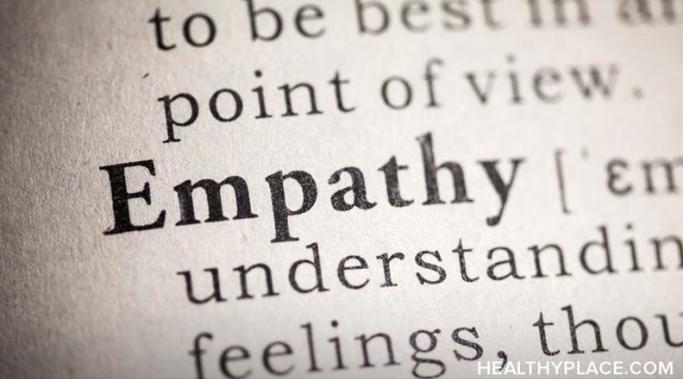I first started receiving psychiatric treatment when I was 20 years old. At that time, I was pretty separated and not very attached to my parents. Nevertheless, they and their opinions did have an impact on me. And when I told my mother I had bipolar disorder her reaction was akin to not believing me. She was entirely ignorant about mental illness (and to be fair, I had been too) and mental illness treatment.
She, naturally, wanted me to treat this problem with herbs and other nonsense. And in spite of the fact that I was detached from this woman, her lack of support affected me. At the time, all my energy was being used to fight bipolar disorder, and now I had to fight her too. It was kicking me while I was down. Way, way down. And while she didn’t see it that way, I can attest to the fact that it sure as heck felt that way.
But luckily for me, I was not under her care. Luckily, even though she eventually pressured me into trying out alternative nonsense, I still got the real, medical help I needed. Had I have been younger, this might not have been the case.
And unfortunately, some youth are in this position right now. Some youths feel they have a mental illness and are in the charge of their parents’. And some youths have even told their parents that only to be met with a wall of disbelief or told they’re “overly dramatic.”
I feel for these youths. They’re in a really tough spot. But there are things youths can do even if a parent doesn’t believe their son or daughter has a mental illness and refuses to support their desire to get help.
Understanding Mental Illness
A get questions from all sorts of family members and friends of people with mental illnesses and, luckily, many of these people want to help. The trouble is people feel intimidated by a diagnosis of mental illness. They don’t even know where to start to help. This is completely normal. A probable lifetime diagnosis is enough to make anyone feel powerless.
But you are not powerless. If you love someone with a mental illness, there are many things you can do to help.
O Romeo, Romeo! wherefore art thou Romeo? Deny thy father and refuse thy name; Or, if thou wilt not, be but sworn my love, And I'll no longer be a Capulet.
There’s a piece of knowledge stuck in a cranny of my mind. Shakespeare. An important guy who wrote some important works, to be sure, and we all study him, for good reason. But how many of us use Shakespeare in our lives? Not too many, I’d wager.
And yet I don’t recall a single class being taught on mental illness. Not one reference to the signs of suicide despite it being the end to Romeo and Juliet, the same play stuck in my mind's crannies. Not one reference to mental illness in my education. And one-in-four people could use that later in their lives.
Bipolar disorder can be a very debilitating illness, to the point where many people have hampered lives because of it. People may find that they can’t have families or jobs because of their disabling bipolar disorder.
And there is nothing wrong with these people. These people are just learning to live a different kind of life because life, unfairly, besought them with a severe mental illness.
But one of the problems these people often have is finding meaning in life. If you see everyone around you with a job or a family or other things your mental illness stops you from having, how do you handle it? How do you find meaning with a severe case of bipolar disorder?
We all have parts of our lives that we wish were different. One might wish her boyfriend hadn’t cheated on her. One might wish that his boss wasn’t so micromanaging. One might wish that she wasn’t bipolar. And so on. One might feel that these situations are unfair.
And sometimes when experiences arise around these situations, we react, not to the situation itself, but to how we wish the situation were and this gets in the way of making healthy choices.
Through my years of being a person with bipolar disorder I have come up with a variety of coping techniques. Many of these techniques have fancy names and are detailed in therapies like cognitive behavioral therapy (CBT). Of course, I used them long before I ever knew they had names.
And one of my current skills is thought-boxing. Or, at least, so I call it. To the best of my knowledge, this particular skill doesn’t have a name. This is a Natasha Skill. Something I developed over years of trying really hard not to let the crazy kill me.
It’s a way of controlling thoughts. It’s a way of keeping the horrendous, bipolar thoughts out of my consciousness, as much as possible. It’s a way of sidestepping all the thoughts that are, indeed, trying to kill me.
It’s devastating to get a diagnosis of bipolar disorder or another mental illness. It means many things to many people, but I know for me, it meant a lifetime condition and a lifetime of treatment. It honestly felt like a death sentence.
But a bipolar diagnosis doesn’t just affect the person with bipolar disorder. A bipolar diagnosis can affect their family and friends, especially if the person with bipolar disorder is younger. It’s completely understandable for a parent to wonder if bipolar disorder is a death sentence. It’s completely understandable for a parent to wonder if his or her child is going to be okay.
Recently I was contacted by someone who was unfortunately going through a divorce. He felt that his spouse left him because he was bipolar. He asked me the question that so many people with a mental illness have asked themselves: I’m bipolar – will anyone ever love me?
Well, I can’t tell the future, but I do know a few things about love.
A while back I wrote on a campaign that was working to change the face of mental illness. It presented real, live people with mental illness that challenged the assumptions that people might have about mental illness. Namely that we’re all unemployed, unsuccessful, useless crazy people.
Now, I did have some problems with the campaign but I applauded their attempt to get people to realize that mental illness is about real people and that each person with a mental illness is an individual with all the possibilities of any other individual in our society.
And I found myself putting my own face on mental illness, bipolar disorder, just the other day. I did it by using the phrase, “. . . people with bipolar, just like me.”
Sometimes we run into people with a mental illness that we don’t know that well, but we recognize the signs of mental illness in them anyway. I can spot a person in mania or depression at 10 paces, and I’m not alone. But what do you say to a person that you don’t really know but that you suspect has a mental illness? What if you saw this person in a mental health crisis?





![MC910217009[1]](/sites/default/files/styles/blog_listing/public/uploads/2013/03/MC9102170091.png?itok=utWsS2Qv)
![MP900178828[1]](/sites/default/files/styles/blog_listing/public/uploads/2013/03/MP9001788281.jpg?itok=xe_PjdU_)


